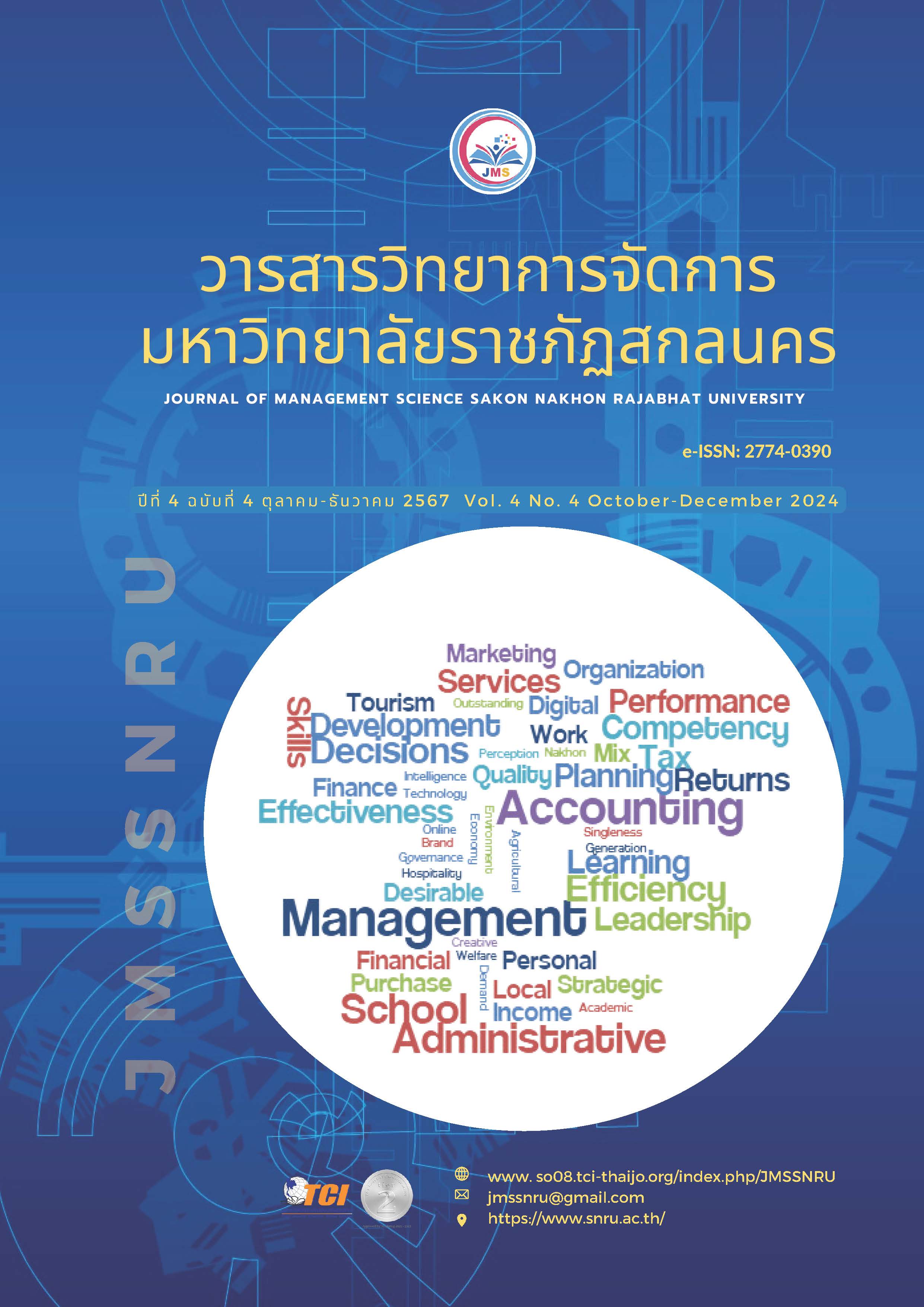DEVELOPMEN OF PUBLIC MANAGEMENT QUALITY TO GOVERNMENT 4.0 OF THE NAKHON PHANOM PROVINCIAL LAND OFFICE
Keywords:
public management quality, government 4.0Abstract
The purposes of this study included the following: 1) o study the quality level of public administration towards bureaucratic 4.0 of the Nakhon Phanom Provincial Land Office, 2) to study the factors of Thailand 4.0 policy that affect the development of the quality of public administration towards the bureaucratic 4.0 system of the Nakhon Phanom Provincial Land Office, and 3) to study the guidelines for developing the quality of public administration towards the bureaucratic 4.0 system of the Nakhon Phanom Provincial Land Office. The sample group consisted of 110 staff in the Nakhon Phanom Provincial Land Office and the Nakhon Phanom Provincial Land Office, branch/division. The size of the sample was calculated by using Yamane's formula. The tool used to collect the data was a set of questionnaires, and the statistics, which was employed for data analysis were frequency, percentage, mean, standard deviation, and multiple regression analysis. The study revealed these results: 1) The quality level of government management toward the bureaucratic 4.0 at the Nakhon Phanom Provincial Land Office was overall at a high level. 2) Thailand 4.0 policy factors in the areas of technology, creativity, and innovation significantly affected the quality of government management towards the bureaucratic system 4.0 at the .05 level. 3) The guidelines for developing the quality of government management towards the bureaucratic system 4.0 at the Nakhon Phanom Provincial Land Office included: 3.1) in terms of leading the organization, there should be thorough communication and transmission of vision, strategy, goals, and indicators to all levels of the organization. 3.2) In terms of strategic planning, strategies and plans should be established to respond to future changes. 3.3) In terms of prioritizing service and stakeholders, there should be a satisfaction assessment in an appropriate format to obtain information useful for analyzing and improving work processes. 3.4) In terms of measurement, analysis, and knowledge management, information should be managed efficiently and made usable. 3.5) In terms of focusing on personnel, personnel should be encouraged to see the importance of government management towards the bureaucratic system 4.0 until it becomes part of the organizational culture. 3.6) In terms of focusing on operating systems, there should be a system for continuously monitoring and reviewing operating results to use such results to improve and develop the organization efficiently and sustainably.
References
นารี คำมุงคุณ. (2563). คุณภาพการบริการของสำนักงานที่ดินจังหวัดนครพนม. วิทยานิพนธ์รัฐประศาสนศาสตรมหาบัณฑิต สาขาวิชารัฐประศาสนศาสตร์ มหาวิทยาลัยราชภัฏสกลนคร.
มยุรี วีระธรรมโม. (2563). แนวทางการพัฒนาคุณภาพการบริหารจัดการภาครัฐสู่ระบบราชการ 4.0 (PMQA 4.0) ของสำนักงานที่ดินชุมพร. วิทยานิพนธ์รัฐประศาสนศาสตรมหาบัณฑิต มหาวิทยาลัยนานาชาติแสตมฟอร์ด.
สำนักงาน ก.พ.ร. (2565). คู่มือการประเมินสถานะของหน่วยงานภาครัฐ_4.0 ฉบับปรับปรุง พ.ศ. 2566. กรุงเทพฯ: สำนักคณะกรรมการพัฒนาระบบราชการ (ก.พ.ร.).
อังคณา แย้มนิล. (2562). การพัฒนาคุณภาพการบริหารจัดการภาครัฐ (PMQA) ในการบริหารองค์กรภายใต้นโยบาย Thailand 4.0 ของหน่วยงานในสังกัดกระทรวงทรัพยากรธรรมชาติและสิ่งแวดล้อม. วารสารวิทยาการจัดการ, 8(1), 108-122.
Downloads
Published
How to Cite
Issue
Section
License
Copyright (c) 2024 JOURNAL OF MANAGEMENT SCIENCE SAKON NAKHON RAJABHAT UNIVERSITY

This work is licensed under a Creative Commons Attribution-NonCommercial 4.0 International License.
An article published in the Journal of Management Science. Sakon Nakhon Rajabhat University is the opinion, copyright and responsibility of the author of the work.







